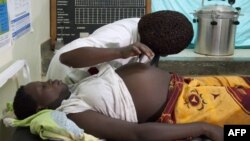As health experts stare down a looming health care worker shortage and try to find solutions, African nations say they are especially worried in the face of possible U.S. cuts to international aid.
In Uganda, the impact of poor-quality health services and a shortage of skilled health workers can be measured in human lives.
"We are losing 17 mothers and 106 newborns every day," said Faridah Luyiga Mwanje of White Ribbon Alliance, an advocacy group that campaigns for women's health and safe childbirth.
Mwanje's sister became part of that grim statistic in 2013, a tragedy Mwanje attributes to doctors intervening too late and a lack of blood supplies. Her sister bled to death in a high-end hospital in Kampala, leaving behind four children.
Her baby boy survived, but was born with cerebral palsy and suffers from developmental delays and convulsions.
In rural Uganda, Mwanje says, the situation is worse.
"There are no health workers," she said. "There's a general lack of lifesaving commodities, the infrastructure is poor, health workers don't have housing, the [operating] theaters are dilapidated, health facilities are not connected to the national power grid, and there's no running water in these facilities."
45 countries convene
Worldwide, that shortage and other health care challenges lead to 2.4 million preventable deaths of mothers and children every year. And making the picture even bleaker, by the year 2030, the World Health Organization estimates the world will be short 18 million health workers, a loss Mwanje says will be keenly felt in countries like Uganda.
Health experts and advocates from 45 countries convened this year in Johannesburg to discuss this looming problem. Stefan Peterson, UNICEF's Chief of Health, told VOA that major gains can be made without complicated, costly medical research.
"I think we have many effective medical interventions that can save lives, but they don't reach the people who need it, and the people don't reach those interventions at the right time," he said. "So what we're talking about now is actually reducing access barriers by making health services more accessible, improving quality of those health services, so that these available, and even affordable, medical interventions reach the people who need them. And by doing that, we can save at least two-thirds of those lives without new innovation."
He says African countries also have benefited from expanding community health programs, with low-level health workers who handle patients' basic needs and shift some of the burden off nurses and doctors.
Possible funding cuts
But these changes will require money, and top health officials are concerned about possible funding cuts from the United Nations' largest contributor, the United States. Mwanje says that she isn't sure her country could recover from that sort of aid setback.
"We are truly concerned that donors are cutting back funding," she said. "Because our governments, well, they're not prioritizing health and they've relied mainly on donor funding. So, it will take them a long time to adjust — if they actually adjust. So we hope that donors can rethink their decisions and invest in health in countries where there are marginalized people. Because we live in a global village, and health affects all of us."




